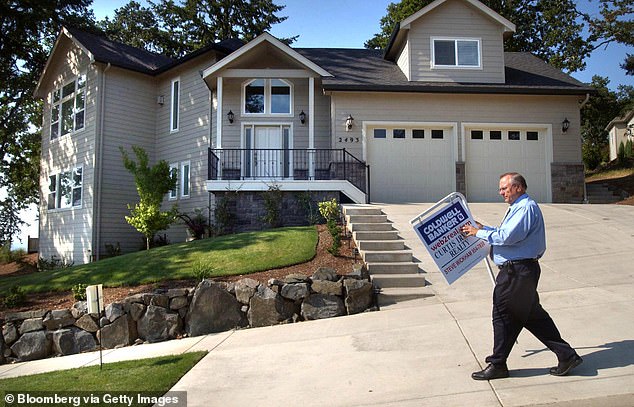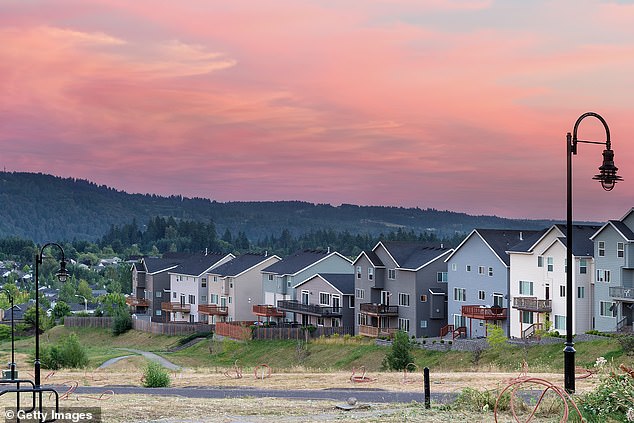The western state where migrants get $30,000 homebuyer grants but citizens are excluded
Oregon residents have reacted angrily to a taxpayer-funded plan that would give illegal immigrants $30,000 to buy homes, but exclude U.S. citizens.
Hacienda Community Development Corporation, a Latino-led group in Portland, says in a promotion that it will give first-time homebuyers up to $30,000 to purchase a home.
But there’s a catch, the ad says.
The scheme is ‘only for people who are not US citizens.’
It is open to refugees, asylum seekers, green card holders and people who arrived in the U.S. illegally as children, the report said.
Hacienda CDC Helps Migrant Families Enter Oregon Housing Market, But U.S. Citizens Are Excluded

Hacienda’s promotional materials state that the $30,000 grants are “intended only for non-U.S. citizens.”
This revelation comes as uncontrolled migration and border security emerge as key issues in the 2024 presidential election.
Americans are concerned about the record influx of migrants under the Biden administration and the strain on services from newcomers seeking financial assistance.
Oregon State Rep. Ed Diehl is among those who said he was “shocked” by the plan, which he said was funded through the state’s Economic Equity Investment Program (EEIP).
“American citizens in Oregon are struggling to find and buy a home,” the Republican wrote.
“We have a severe housing shortage in this state. I am appalled that Oregonians’ hard-earned, limited tax dollars are being used to prioritize home ownership for certain non-U.S. citizens.”
Hacienda and its CEO Ernesto Fonseca, who comes from an impoverished part of Mexico, did not respond to requests for comment from The Mail.
The post was discovered earlier this month and shared on X by a community information group called Citizen of Oregon.
The group says the secret was shared through schools so that immigrant parents of students could also be made aware.
As in much of the US, buying a home has become a challenge for many Oregonians.
The average home price rose more than 1 percent this year to $502,500, but in Lake Oswego and other upscale zip codes, prices quickly top $1 million.
Portland, the state’s largest city, ranks among the top 10 worst metro areas for housing, according to Zillow.

Oregon Rep. Ed Diehl, a Republican, says he is “shocked” that U.S. citizens are not eligible

The average home price in Oregon rose more than 1 percent this year to $502,500
Of course, houses are just as expensive for American citizens as they are for foreigners living in Oregon.
But using taxpayers’ money to help migrants and exclude citizens was a step too far for some X users, who reacted to the revelations with disbelief.
“This isn’t real,” one user posted.
“How is this even remotely possible?” asked another.
Hacienda is funded in part through the EEIP, which was established through the Oregon Economic Equity Investment Act of 2022.
It receives millions of dollars from Oregon state taxes and, through the U.S. Department of Housing and Urban Development, from federal taxes.
The EEIP received $15 million at its launch, and an additional $8 million was allocated this year.
That money will be distributed through Hacienda and other groups that provide “culturally responsive services,” according to Oregon Senate Bill 1579.
The funds are intended to support ‘economic stability, self-reliance, asset building and economic equality among disadvantaged individuals, families, businesses and communities’.
Hacienda received funding this year from Business Oregon and EEIP to the tune of $692,775, according to Oregon Citizen.
The group did not respond to our questions about excluding U.S. citizens from its mortgage plans.
Founded in 1992, it aims to take in poor “immigrants and communities of color,” according to its website.
Immigration has become a major issue in Oregon, as Republicans in the state seek to repeal several asylum laws that protect immigrants from deportation.
Yet voters in the Beaver State have nuanced views on immigrants.
An April 2023 poll by Portland-based DHM Research found that about half of voters say illegal immigration is a serious problem.

Hacienda CEO Ernesto Fonseca, who comes from an impoverished part of Mexico, says he wants to get more migrants into the housing market

In some of Oregon’s more expensive zip codes, the median home value is already over $1 million.
Still, a majority of voters at the time said they supported keeping Oregon’s asylum status, and nearly 60 percent said immigration was positive for the country.
Studies have shown that legal immigrants pay taxes and contribute to the growth of the U.S. economy. Yet other research has shown that illegal immigrants can be a burden on social services.
The Biden administration last week released its latest border crossing numbers, showing that the number of migrants apprehended in July fell by 32 percent. The federal government said that was the “lowest number since September 2020.”
The staggering drop in the number of migrants crossing the border comes four years after the worst border crisis the U.S. has ever seen, with historic numbers of migrants arriving at the border to try to get in, including many seeking asylum.
More than 10 million migrants have entered the U.S. since October 2021, according to federal statistics, straining federal agencies that process migrants and bringing border communities like El Paso, Texas, to their knees.
Since January, the Mexican government has stepped up measures to stop migrants, mainly from South and Central America, from traveling through the country to the US.
Under pressure from the Biden administration, Mexican officials have set up checkpoints to detect migrants on buses and trains heading north and return them to the Mexico-Guatemala border.
In June, the White House announced changes to the way migrants can seek asylum at the border.
Any migrant who enters the US illegally will be deported and will not be allowed to apply for asylum.
